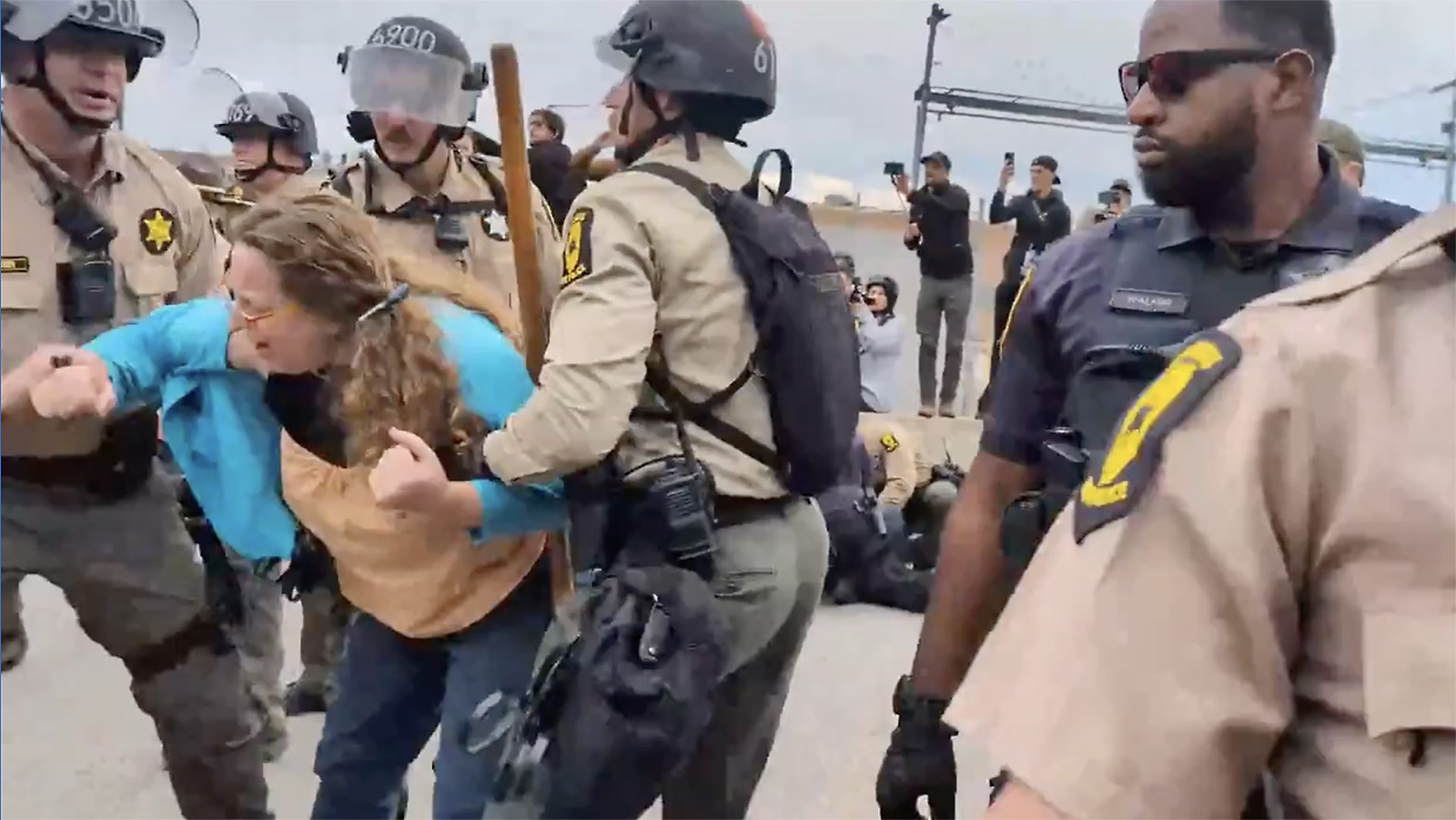
(RNS) — Last Friday (Oct. 17), the Rev. Hannah Kardon, a United Methodist minister in the Chicago area, stood alongside other protesters demonstrating outside the Immigration and Customs Enforcement detention facility in Broadview, Illinois. As a line of Illinois State Police began marching toward her and other demonstrators, gripping wooden batons, footage shows the pastor with her hands raised in prayer.
Officers then pushed into the protesters, forcing them back. One officer shifted his stance, reared back and began shoving his baton like a battering ram — jamming it repeatedly, Kardon says, into her leg. A few seconds later, the pastor was pulled from the crowd and thrown to the ground.
All the while, Kardon says, she never stopped praying. When officers began to arrest her, they tied her arms behind her back and placed her along the curb.
“I said, ‘God, please help these people to know that what they’re doing is wrong, and help them to turn around,’” Kardon, who leads United Church of Rogers Park in Chicago, said in an interview. Her leg, she said, has developed visible bruises.
The incident, most of which was captured on film by a journalist with the independent outlet Unraveled, is the latest example in a growing list of Chicago-area clergy who have been met with violence after confronting state and federal agents to protest the actions of ICE. As President Donald Trump’s ongoing immigration crackdown in Chicago continues, a diverse array of faith leaders from across the region are speaking out against the government’s treatment of immigrants — with many voicing willingness to risk arrest and physical harm to protect migrants.
Kardon is among the more than 210 signers of a letter signed by mostly Chicago-area Christian clergy. Titled “Jesus is Being Tear Gassed at Broadview,” the letter railed against ICE and agents “hunting and terrorizing of immigrant communities” in the city. The letter was made public the same day Kardon was arrested and has accrued more than 100 additional signatures since then.
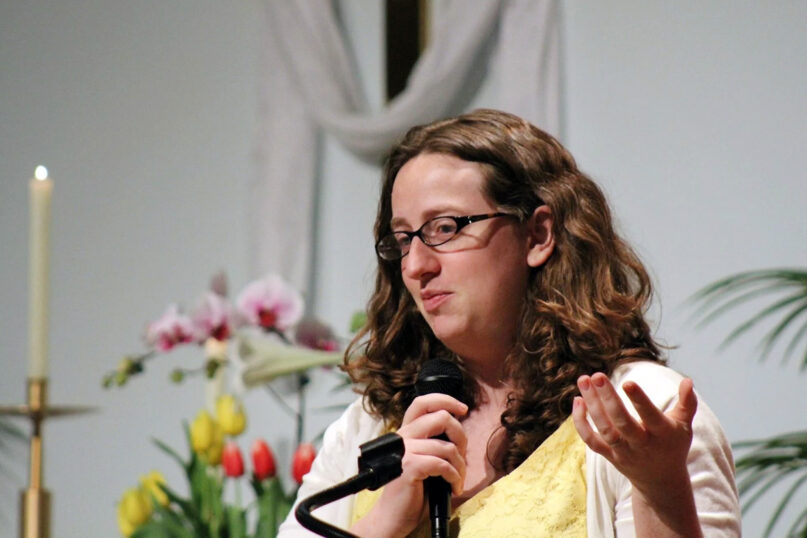
The Rev. Hannah Kardon. (Photo courtesy of the United Church of Rogers Park)
The letter referenced multiple efforts to provide Communion to immigrants detained in the facility — both of which were denied by the Department of Homeland Security — as well as a recent viral video of the Rev. David Black, a Presbyterian minister, being shot with pepper balls by agents as he prayed outside the facility.
“We come offering bread and prayer, hope for justice and healing — we leave washing pepper spray out of each other’s eyes,” the letter reads.
But the letter, citing the example of civil rights icon the Rev. Martin Luther King Jr., argues clergy are nonetheless compelled by their faith to advocate for immigrants, even amid threats of violence.
“We accept that following Christ’s example may mean we are mocked and assaulted, opposed and even arrested,” the letter reads. “Jesus has guidance for this as well, saying, ‘Blessed are you when people insult you, persecute you, and falsely say all kinds of evil against you.’ If he were living today, we believe he might add ‘pepper spray, body slam and arrest you’ to his beatitude.”
Signers of the letter represent an unusually diverse array of Christian groups, hailing from Presbyterian, Catholic, Black Protestant, United Church of Christ, Methodist, Lutheran, Mennonite, Episcopalian, Anglican, Unitarian Universalist, Disciples of Christ and Baptist traditions, as well as evangelical denominations and nondenominational evangelical churches.
Signers are primarily pastors but also include members of local religious institutions such as the Rev. Enzo Del Brocco, head of the Catholic Theological Union; the Rev. Dennis R. Edwards, dean of North Park Theological Seminary, which is affiliated with the Evangelical Covenant Church; Christian Scharen, a theology professor at the Lutheran School of Theology at Chicago, which is affiliated with the Evangelical Lutheran Church in America; and Mike Hogue, a theology professor at Meadville Lombard Theological School, a Unitarian Universalist school.
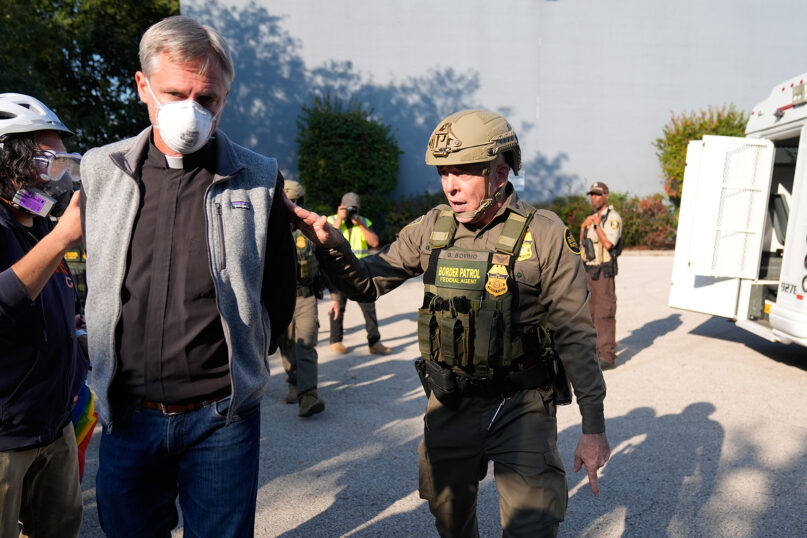
Greg Bovino, the chief patrol agent for the U.S. Border Patrol El Centro sector, right, walks beside the Rev. David Swanson, left, with his hands behind his back, near an Immigration and Customs Enforcement facility in Broadview, Ill., Oct. 3, 2025. (AP Photo/Erin Hooley)
DHS did not immediately respond to a request for comment on the letter, but religious pushback to ICE continues to grow. The Rt. Rev. Paula E. Clark, the bishop who oversees the Episcopal Diocese Of Chicago, also signed the letter on Tuesday. And while Cardinal Blase Cupich, the Catholic archbishop of Chicago, has not signed on, he released a new statement Tuesday afternoon declaring solidarity with migrants.
“Families are being torn apart. Children are left in fear, and communities are shaken by immigration raids and detentions. These actions wound the soul of our city,” Cupich’s statement reads. “Let me be clear. The Church stands with migrants.”
The Cardinal then adds: “Our parishes and schools will not turn away those who seek comfort, and we will not be silent when dignity is denied in the enforcement of the law, it is essential that we respect the dignity of every human being.”
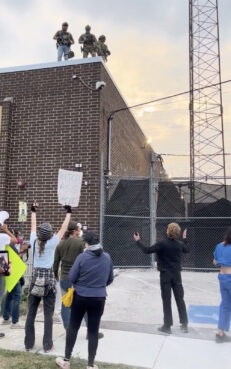
The Rev. David Black prays below masked agents on the rooftop of an Immigration and Customs Enforcement detention facility in Broadview, Ill. (Video screen grab)
The Rev. Lucas Hergert, a Unitarian Universalist minister and chief author of the clergy sign-on letter, said the outpouring of support has buoyed the ranks of what was initially a small cadre of religious demonstrators outside the Broadview facility. Over the past two months, the pastor said, he has witnessed agents lash out at demonstrators with rubber bullets and tear gas, the latter of which he experienced himself.
“That’s done indiscriminately by the ICE agents,” said Hergert, who pastors North Shore Unitarian Church in Deerfield. “It’s almost like a glee that they have.”
The treatment of religious demonstrators at the facility has become a political flashpoint and, ultimately, a legal one: Last week, a federal judge issued a temporary restraining order barring DHS agents in the region from taking certain violent actions against demonstrators, reporters and “religious practitioners” except in extreme circumstances. Around the same time, Illinois State Police began guarding the facility in addition to DHS agents, but the judge in the case — which included Black, the Presbyterian minister struck by pepper balls, as a plaintiff — has already expressed concerns that ICE may not be complying with various aspects of her order.
Meanwhile, Hergert said ICE’s actions in Chicago — such as high-profile raids on apartment buildings and tossing tear gas in residential areas after squaring off with angry locals — have spurred other religious leaders to join the cause.
“The fact that we have people who are in in our communities, in our churches and in our neighborhoods, who are just being kidnapped, disappeared into these vans with blacked-out windows and masked agents — it’s really a moral crisis,” Hergert said. “It’s catalyzed people across a broad spectrum.”
The Rev. Abby Holcombe, a United Methodist minister, has also been a regular at protests. She recently led an effort to offer Communion to detainees inside the facility and said religious interest in similar demonstrations has surged in recent weeks, including among members of her own denomination.
“I started a chat with like four other pastors” about the protests weeks ago, she said. “Now it has over 40 people.”
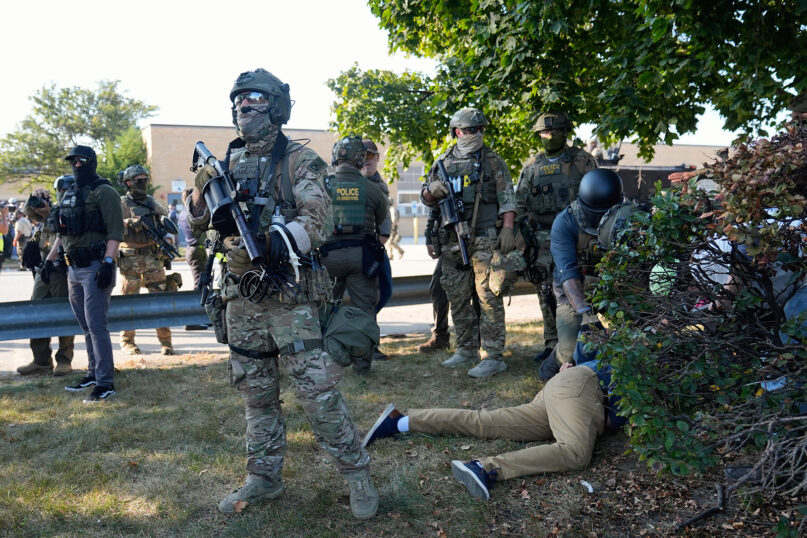
Law enforcement detains a protester near an Immigration and Customs Enforcement facility in Broadview, Ill., Oct. 3, 2025. (AP Photo/Erin Hooley)
Indeed, religious diversity presence has expanded outside the Broadview facility in recent weeks. Mainline Protestant clergy have been a mainstay, as have Unitarian Universalist ministers, Jewish activists and Catholic leaders. But they have been joined by members of more theologically conservative traditions: Earlier this month, members of The Church of Jesus Christ of Latter-day Saints organized a protest outside the Broadview facility, and a contingent from Wheaton College — a prominent evangelical Christian school — convened a vigil as well.
As for Kardon, her arrest over the weekend left her with bruises but has done little to deter her desire to advocate on immigrants’ behalf.
“Though being arrested is new to me, even though being beaten is new to me, I know it’s not new to Christians following Christ,” she said.
Kardon said fellow Methodists have showered her with support, including her local bishop, who prayed with her the day she was arrested. Asked about the incident, the Northern Illinois Conference of the UMC pointed to a resolution passed at the group’s annual conference in June, which called on conference members to “challenge the current administration to stop its criminalization, detention, and deportation of immigrants and instead to work on ways to make pathways to citizenship easier and not more restrictive.”
And despite her harrowing experience, Kardon insisted attention should not be on faith leaders like herself, but on the focus of their prayerful protests: immigrants being detained and deported by ICE.
“If they’re willing to do it to me in the sunlight,” she said, “what are they doing to detainees in the dark?”
